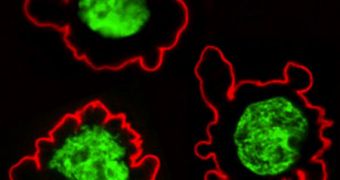Japanese researchers managed in a new study to shed more light on why two very commonly used types of stem cells undergo programmed cell death when separated from each other.
In the emerging field of regenerative medicine, stem cells are heralded as the ultimate remedy. Experts say that the cells can be used in anything from curing cancer to creating artificial replacement organs.
Two types of cells commonly used in this research are human embryonic stem cells (ESC) and induced pluripotent stem (iPSC), but they die when separated from each other.
The process, called programmed cell death, or apoptosis, has been a mystery for scientists working in the field, who have been trying to make sense of it for several years.
In the new study, scientists from the RIKEN research institute in Japan managed to shed more light on the intricate mechanisms that underlie apoptosis in stem cells.
Their findings could lead to developing more efficient ways of growing human stem cells inside cultures, thus making it easier for scientists to use them for other research efforts.
Bioengineers explain that ESC can currently be grown only in clumps. This makes them very hard to get to and study, but scientists say that these cells must not lose contact with other ESC.
As soon as this happens, and an individual cell is harvested from the clump, the mechanisms underlying apoptosis are triggered, and the cell dies, PhysOrg reports.
The Japanese team says that the enzyme called ROCK (Rho-dependent protein kinase) may be responsible for jump-starting this process.
Applying an inhibitor for this enzyme could result in the disappearance of programmed cell death in single ESC, says the team, which was led by expert Yoshiki Sasai.
The expert is based at the RIKEN Center for Developmental Biology in Kobe, and his team conducted the work together with colleagues from the Kyoto University.
Experts believe that the new discoveries could result in a series of innovation in the way ESC can be handled. Having the ability to work with these cells without fearing apoptosis could result in important breakthroughs for the field of medicine.
Details of the new research effort are published in the esteemed medical journal Cell Stem Cell.

 14 DAY TRIAL //
14 DAY TRIAL //